Have you ever had trouble sleeping, feeling wide awake and uncomfortable? Many of us face sleepless nights, but we often don’t know why. We might drink caffeine in the morning or alcohol at night to relax. But these habits can harm our sleep quality.
Caffeine and alcohol can make it hard to sleep well. Studies show that caffeine can cut down on sleep time. Drinking alcohol can also lead to poor sleep quality1. It’s important to understand how these substances affect our sleep, as millions struggle with sleep deprivation from them.
- Caffeine can significantly reduce sleep duration, impacting overall restfulness.
- Alcohol consumption correlates with poor sleep quality and increased night-time awakenings.
- Both substances can create a cycle of sleep disruption, making it challenging to achieve restful sleep.
- Many individuals may not realize how caffeine and alcohol together exacerbate their sleep issues.
- Understanding these impacts is key for improving sleep quality and health.
Introduction to Sleep and Substances
Sleep is key to our health, but many struggle to get enough rest. Caffeine and alcohol are big culprits, affecting how well we sleep. Almost 90% of people who drink alcohol at night have sleep problems2. Doctors say to stop drinking alcohol 3 hours before bed to sleep better2.
Caffeine is also a big problem, with 90% of Americans drinking it every day3. The average American drinks about 200 mg of caffeine daily. Those who drink it often take in 154 to 1285 mg3. This has led to more people sleeping less than 6 hours a night, going from 13% to 20% between 1999 and 20093. Caffeine makes it hard to fall asleep and lowers melatonin levels, making sleep worse3.
Caffeine and alcohol make it hard to sleep well. Knowing how they affect sleep is important for our health. It helps us avoid the dangers of substance use.
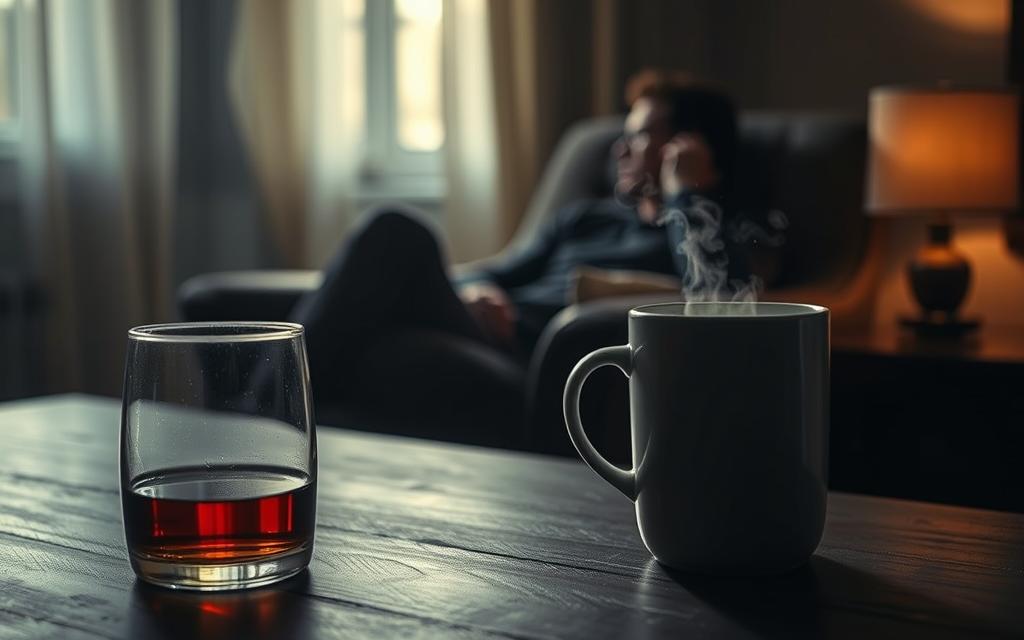
Caffeine and Its Widespread Use
Caffeine is a widely used substance found in coffee, tea, and soft drinks. It’s consumed by about 80% of the world’s population every day4. Almost 90% of adults drink caffeinated beverages weekly, showing how common it is5. It helps people feel more alert and focused, improving their brain function.
The FDA says adults can safely have up to 400 milligrams of caffeine daily. Drinking it in moderation can make you feel better and more focused6. But too much can cause anxiety and trouble sleeping. Drinking caffeine can cut down your sleep by about 10 minutes per cup the next day5.
Knowing how much caffeine is in different drinks is key to controlling how much you have. Here’s a list of some common sources:
| Beverage | Caffeine Content (mg) |
|---|---|
| Coffee (8 ounces) | 100-200 |
| Energy drink (8-16 ounces) | 50-300 |
| Soda (12 ounces) | 0-70 |
| Tea (8 ounces) | 40-120 |
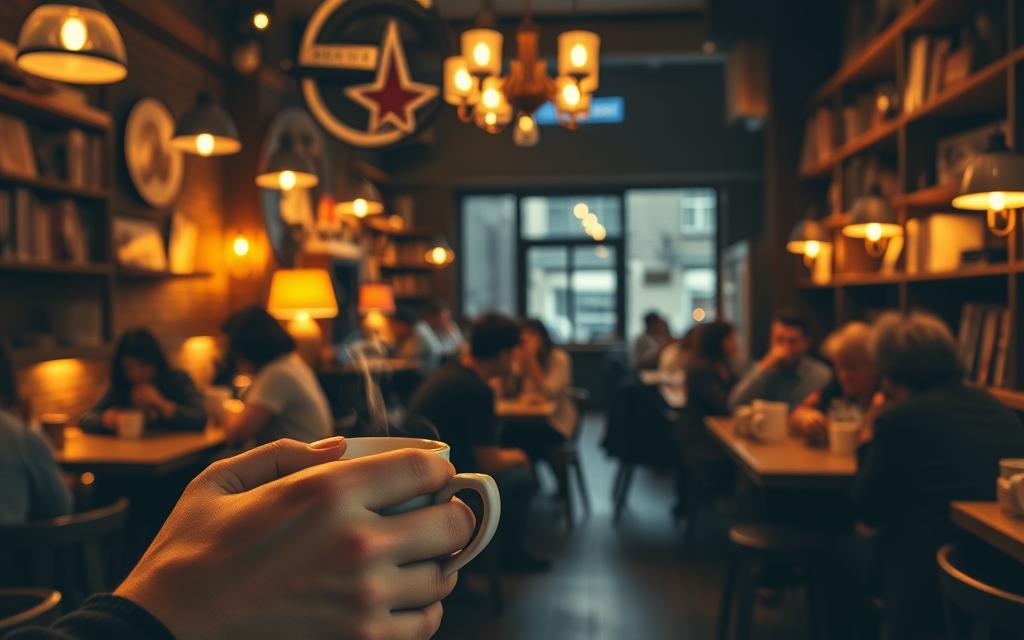
Even though many people love caffeine, how it affects you can vary. Its effects start about 30 minutes after drinking and can last up to five hours or more6. As you get used to it, you might need more to feel the same effects. Understanding how caffeine fits into our lives can help us use it wisely.
Alcohol Consumption Trends Worldwide
Alcohol is a substance many people use, but it can harm health and sleep. About 74% of people aged 15 and older drink regularly. This means the average person drinks around 6.4 liters of alcohol each year7. Drinking habits differ by culture, with some groups drinking more than others.
In Korea, for example, 21.8% of adult men drink too much, while only 6.0% of women do7. Drinking can mess up sleep, making it hard to get a good night’s rest8. It can lead to insomnia and broken sleep patterns.
Drinking too much alcohol is linked to many health problems. Poor sleep, like snoring, is also tied to drinking too much7. This shows how drinking affects not just our health but also how we sleep.
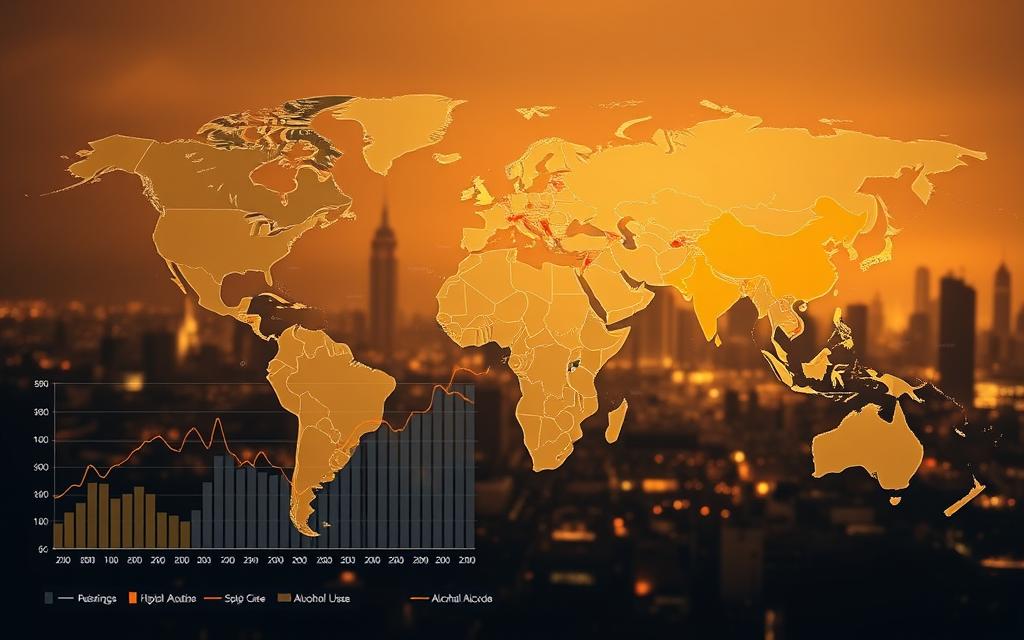
The Science of Sleep
The science of sleep is complex, involving many stages that help us rest. These stages include REM and non-REM sleep. Each stage is important for our body’s repair, brain function, and emotional balance. Caffeine stays in our system for about 5–6 hours, affecting sleep if we drink it too late9. It can also make pain worse, which is bad for those with chronic pain9.
Alcohol, by contrast, cuts down on REM sleep, which is key for our mental and emotional health. Drinking alcohol regularly can make our sleep broken, with us waking up a lot8. Almost 90% of people who drink alcohol at night have sleep problems2. Drinking too much can also lead to long-term sleep issues, like insomnia2.

Keeping our sleep quality safe is very important. The science of sleep shows that bad sleep can cause health problems. It’s key to control how much caffeine and alcohol we have. Tracking our intake is also helpful. Drinking water, keeping electrolytes balanced, and using herbal teas can help us sleep better, fitting into a healthy lifestyle.
| Sleep Stage | Description | Role in Sleep Health |
|---|---|---|
| REM | Characterized by rapid eye movement, dreaming, and increased brain activity. | Critical for emotional regulation and cognitive restoration. |
| NREM Stage 1 | Light sleep where one drifts in and out of sleep. | Prepares the body for deeper sleep stages. |
| NREM Stage 2 | Moderate sleep where heart rate slows, and body temperature drops. | Supports memory consolidation and healing. |
| NREM Stage 3 | Deep sleep, essential for physical recovery and growth. | Crucial for overall health and well-being. |
Impact of Caffeine and Alcohol on Sleep
Caffeine and alcohol change how we sleep, affecting sleep quality differently. Caffeine cuts sleep short, reducing it by 10 minutes for each cup the day before10. It also makes falling asleep harder and shortens total sleep time1. On the other hand, alcohol messes with our sleep cycle, hurting REM sleep. This is key for thinking and remembering things11.
Caffeine might make us feel less tired after drinking alcohol, but it doesn’t really wake us up or fix sleep problems11. Yet, mixing caffeine and alcohol might lessen their sleep-harming effects. This could lead to needing more of both to feel awake, which worsens sleep quality11.
Drinking these beverages can also make us dehydrated, which hurts sleep. Even a little dehydration can make us wake up more during the night11. Using caffeine and alcohol together is common, but it can lead to dependence on both10. It’s important to think about how these habits affect our health, including our sleep.
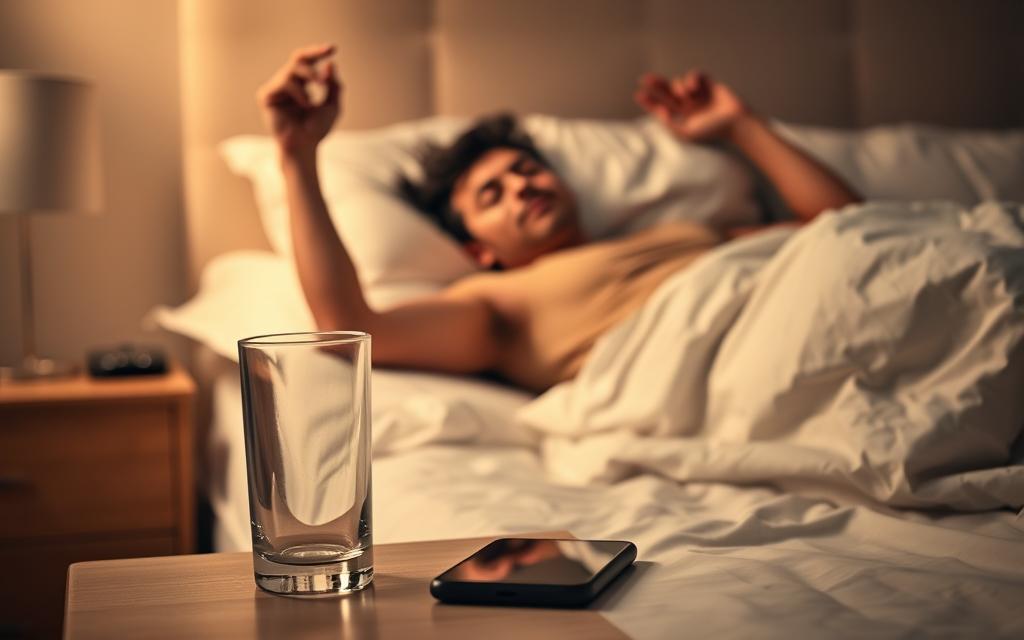
Effects of Caffeine on Sleep Quality
Caffeine affects sleep patterns and how long we sleep. Research shows that each cup of caffeine cuts sleep by about 10 minutes10. This shows that even a little caffeine, if it’s too late in the day, can build up sleep debt over time1.
It also delays when we enter REM sleep, which is key for good sleep10. This can mess up our natural sleep cycle, hurting our sleep quality10.
People in studies found it harder to fall asleep after drinking caffeine in the evening1. As more people deal with insomnia, knowing how caffeine affects sleep is very important10. Some think caffeine helps with tiredness from bad sleep, but this can actually harm our sleep and health1.
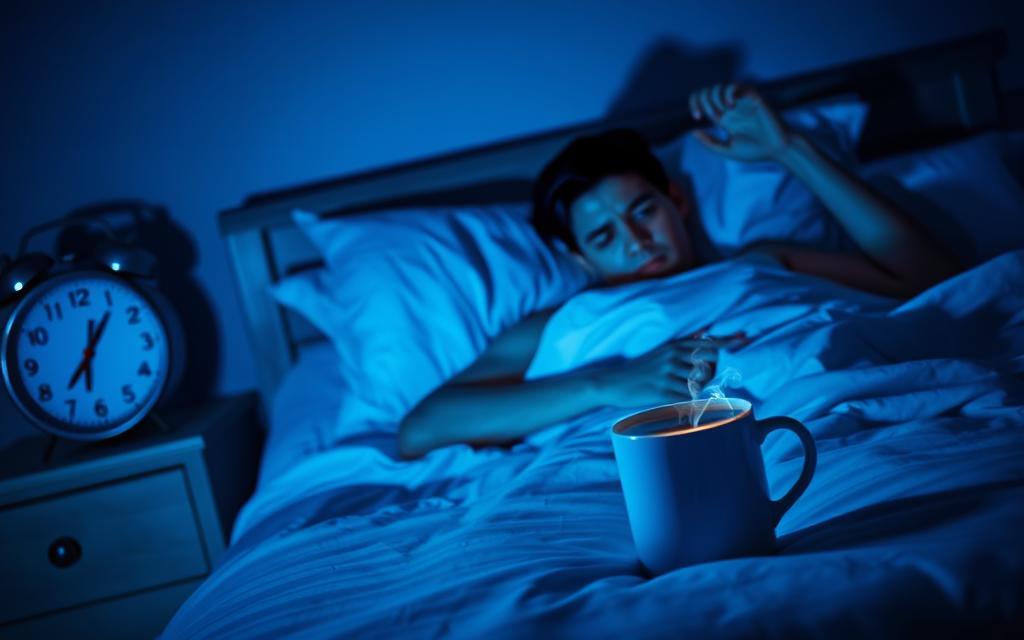
Effects of Alcohol on Sleep Quality
Alcohol affects sleep quality a lot. Many people struggle with sleep issues after drinking. About 50% of adults over 65 have had alcohol in the past year. Among those with ongoing insomnia, 30% use alcohol to help them sleep12.
Even though 67% think alcohol helps them sleep, the truth is different. Up to 70% of drinkers actually have insomnia. This shows a big gap between what people think and what really happens12.
Alcohol also messes with REM sleep. A small amount can make sleep quality drop by 9.3%. A moderate amount can make it worse by 24%. And a big amount can lower sleep quality by 39.2%13.
Drinking more often means waking up a lot at night. This breaks up sleep and causes many interruptions13.
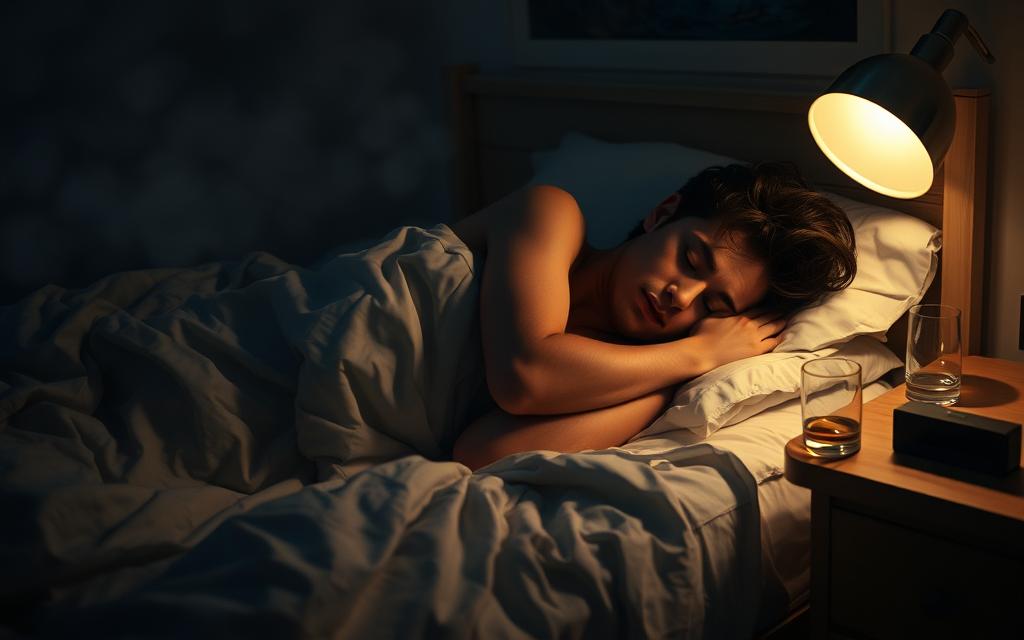
Drinking regularly can lead to serious problems. It can increase the risk of sleep apnea by 25%12. It can also turn sleep issues into long-term problems. People might wake up many times at night and feel tired during the day12.
Drinking before bed makes sleep problems worse. Studies show it makes insomnia symptoms worse and changes sleep patterns. This leads to poor REM sleep1213. Using alcohol to deal with sleep issues can start a cycle of poor sleep and health problems.
Caffeine Intake and Sleep Disorders
Between 50 to 70 million Americans deal with sleep disorders. These issues can lead to heart disease and diabetes14. Drinking too much caffeine can make these problems worse, linking caffeine to sleep disorders15.
Caffeine hits its peak in the blood 30 to 60 minutes after drinking it. It stays in the body for 3 to 5 hours15. Drinking caffeine before bed can mess up sleep and make it poor quality14.
A study with 785 people found that caffeine 6 hours before bed cuts sleep by about 1 hour15. Heavy caffeine users might face a higher risk of insomnia. The average U.S. adult drinks about 300 mg of caffeine daily, much more than the global average15.
Older adults and those sensitive to caffeine might feel caffeine’s effects more strongly15.
It’s key to know how caffeine affects sleep. The FDA says caffeine is safe, but it’s not regulated tightly. This means we need to be careful with how much caffeine we drink, even more so for those with sleep issues.
Alcohol Consumption and Sleep Disturbances
Alcohol and sleep problems are closely related, affecting many people’s sleep. Drinking alcohol before bed can cause more wake-ups, mainly in the second half of the night. This leads to broken sleep patterns.
Alcohol can make you sleep better at first but worsens sleep quality over time. For example, 2 to 3 standard drinks before bed might help sleep at first. But these benefits fade after a few days16.
In the U.S., about 70% of adults drink alcohol, with many facing alcohol-related issues16. Around 15–28% of those with insomnia use alcohol to help them sleep16. Yet, drinking too much before bed can cause severe daytime tiredness, showing alcohol’s complex effects on sleep16.
Studies show that 16% of people have severe insomnia, and 34% have mild insomnia16. Alcohol’s effects last beyond the night, causing daytime fatigue that can harm daily life. About 10% of Americans drink alcohol every day, which may lead to more sleep problems16.
There’s a strong connection between alcohol and sleep issues. Alcohol abuse is common among those with insomnia, showing a cycle of worsening problems17. Men who drink over 21 units a week wake up more at night17. It’s important to know how alcohol affects sleep to get better rest.
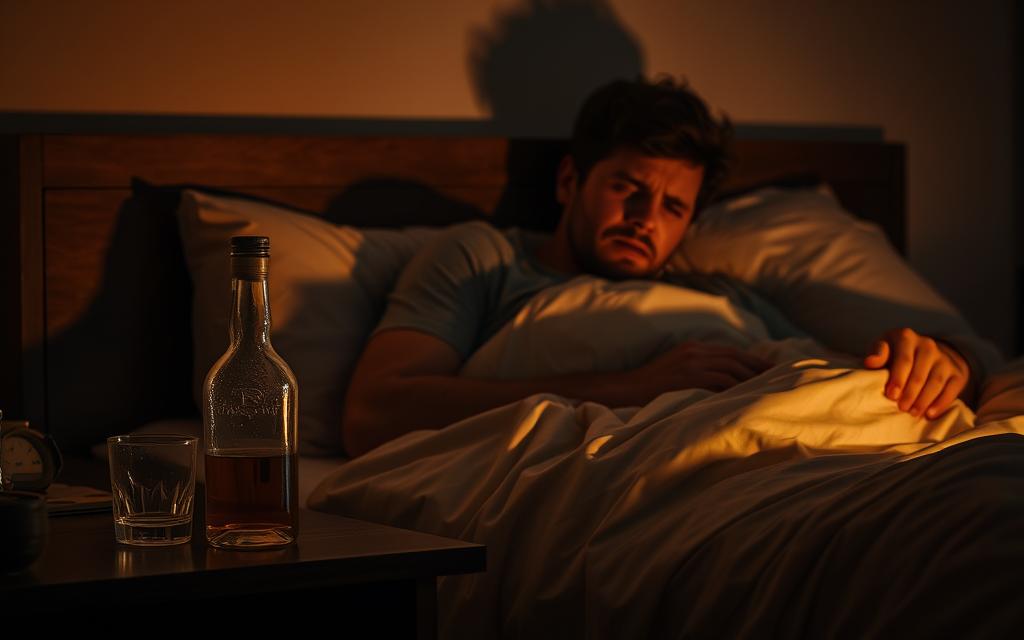
Sleep Disruption from Alcohol and Caffeine
Alcohol and caffeine can make it hard to sleep. Even a small amount of alcohol can cut sleep quality by 9.3%13. Drinking more can lower sleep quality by up to 24%13. Drinking a lot can even cut sleep quality by 39.2%13.
Drinking alcohol before bed can lead to insomnia. This can cause broken sleep and more wake-ups at night13.
Caffeine, often drunk during the day, can shorten sleep. But, drinking caffeine and alcohol together might not have the usual bad effects on sleep1. This means caffeine might help you stay awake after a bad night’s sleep from drinking1.
Many people use caffeine to fight off tiredness from bad sleep caused by drinking. This is like a cycle of self-medication1.
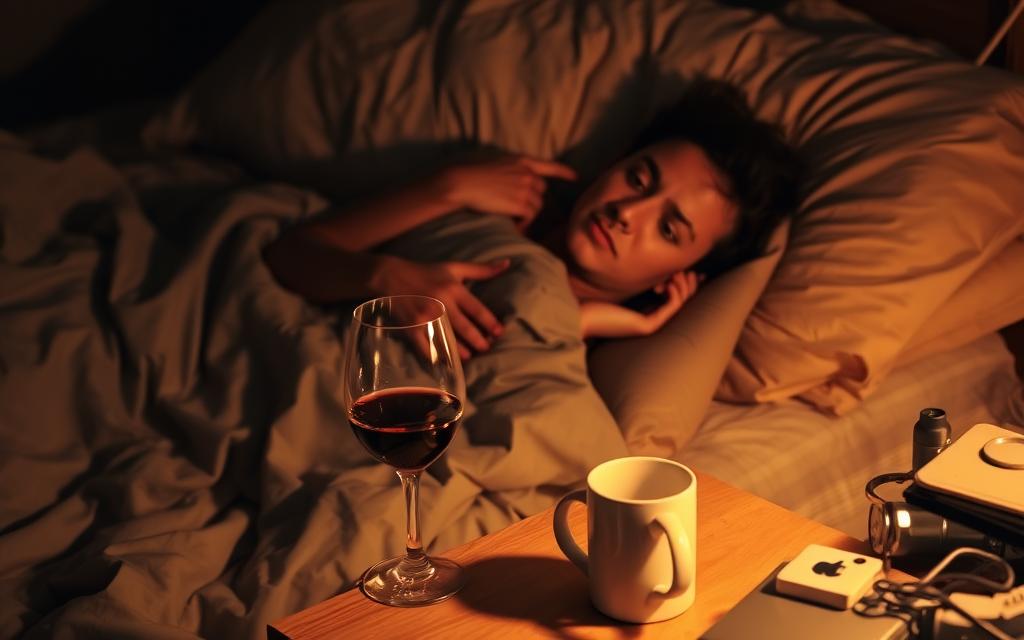
Alcohol can also make sleep apnea worse, raising the risk of airway collapse by 25% during sleep13. It makes you need to go to the bathroom more, disrupting sleep13. It also cuts down on REM sleep, which is key for healing and memory13.
This shows how important it is to know how alcohol and caffeine can harm sleep. We need to be careful about how much we drink and when.
Interactive Effects of Caffeine and Alcohol
The mix of caffeine and alcohol is complex. It affects how people act and sleep. Many use caffeine to fight off alcohol’s sleepiness, thinking it keeps them awake. A study showed 57% of women and 50% of men mix energy drinks with alcohol at parties18. Among those who drank three or more energy drinks, 49% did it to mix with alcohol18.
Drinking caffeine can cut sleep by 10.4 minutes per cup the next day19. Drinking alcohol can lower sleep quality by almost 4% the next night19. Mixing these can lead to unexpected sleep issues, even though caffeine is meant to help19. A study found that mixing them might not improve sleep as expected19. Participants reported no drop in sleep quality but less overall sleep19.
Self-medication with caffeine and alcohol can be harmful. People often try to balance caffeine’s wakefulness with alcohol’s sleepiness. Those who drink energy drinks more often face more alcohol problems18. Knowing this can help improve sleep by avoiding mixing these substances.
The Bidirectional Relationship Between Substance Use and Sleep
The link between substance use and sleep is complex. Poor sleep can make people use more substances. At the same time, using more caffeine and alcohol can make sleep worse. Studies show that substance abuse can mess with sleep, affecting how long it takes to fall asleep and how well you sleep20.
When people stop using substances, they might feel more cravings and want to act on impulse. This can make them more likely to go back to using substances21.
People who have trouble sleeping often have drug or alcohol problems. Using substances for a long time can make it hard to fall asleep and reduce the amount of sleep you get20. Also, sleep problems can make it harder to think clearly, making recovery from substance use disorders harder21.
For example, using stimulants like cocaine can make sleep light and broken. Alcohol might help you sleep at first but can cause big sleep problems later because of withdrawal20. A study showed that many people on methadone and buprenorphine have sleep issues, showing how substance use affects sleep21.
People who use substances more often tend to have irregular sleep patterns. About 63% of adult psychiatric inpatients have sleep problems because of drug and alcohol use20. It’s important to address sleep issues to help manage substance use disorders better.
Strategies to Mitigate Sleep Issues from Substances
To get better sleep, people can try different things. Setting a regular sleep schedule helps a lot. It makes it easier to relax at night.
It’s also important to watch how much caffeine you drink, and when. Drinking caffeine in the afternoon can mess up your sleep. Try to avoid caffeine for at least 8 hours before bedtime to sleep better6.
It’s good to know how much caffeine you can safely have each day. The FDA says adults can have up to 400 milligrams of caffeine daily6. If you have trouble sleeping, knowing how long caffeine stays in your system is key. This can help you decide when and how much to drink6.
Drinking alcohol in moderation is also important for sleep. Many people use alcohol to help them sleep, but it can actually make sleep problems worse. If you have trouble sleeping, it might make you drink more alcohol, which can make sleep even harder. People with insomnia are more likely to develop alcohol problems22.
Trying relaxation techniques, like progressive relaxation training, can help with sleep. It’s good for people with alcohol issues23. It helps create a calm space for better sleep. Talking to a healthcare provider for advice on managing substance use and sleep can also be helpful.
Long-Term Implications of Poor Sleep Quality
Chronic sleep problems from caffeine and alcohol harm our health a lot. They can make our brains and emotions worse, leading to more stress and anxiety. Almost 90% of people who drink alcohol at night have sleep issues, showing how alcohol affects sleep2.
Long-term drinking can cause serious sleep problems like insomnia and sleep apnea. These issues can really hurt our health2.
Caffeine makes us sleep less, which is bad for our health. Drinking caffeinated drinks can cut our sleep time by about 10 minutes each. This shows how caffeine can hurt our sleep over time24.
Drinking alcohol to help sleep can also lead to breathing problems at night. This is true for people with sleep apnea2.
Sleep problems cost society a lot. They make us less productive and increase healthcare costs. Drinking caffeine and alcohol together can make health problems worse. This shows a cycle of needing more of both substances1.
Research Insights: Recent Studies on Caffeine and Alcohol
Recent studies show how caffeine and alcohol affect sleep. Over 80% of people worldwide drink caffeine, with college students leading the way at 92%. They average 159 mg of caffeine daily, sometimes going over 400 mg, which harms sleep and alertness25.
Alcohol, on the other hand, seems to help you fall asleep faster. But it messes with your sleep later on, when your blood alcohol levels are high. Long-term drinking can make sleep worse, leading to less deep sleep and more restless sleep. This can make it hard to stay asleep, which is bad for your health and can lead to drinking more26.
College students also drink a lot of caffeine, saying it boosts their sports performance and social life. But, this can make it harder to sleep well. Studies show that caffeine before bed makes it tough to fall and stay asleep. This shows we need more research on how these substances affect our sleep25.
Conclusion
Caffeine and alcohol both have big effects on how well we sleep. Studies show that caffeine can make it hard to fall and stay asleep. This is a big problem for many people27.
Alcohol might help us fall asleep at first. But it can also mess up our deep sleep and make our heart rate go up. This is shown by changes in heart rate and sleep patterns28.
Knowing how these substances affect sleep is key to better sleep. We should watch how much caffeine and alcohol we use. This helps us sleep well and feel good all day29.
FAQ
How does caffeine affect sleep quality?
Drinking caffeine can make it harder to fall asleep and cut down on sleep time. Even a little caffeine in the evening can mess up your sleep. This can build up and make you feel tired all day.
What are the impacts of alcohol on sleep?
Drinking alcohol can wake you up during the night and hurt the quality of your REM sleep. It breaks up your sleep, making you feel groggy and tired the next day.
Can caffeine contribute to sleep disorders?
Yes, too much caffeine can lead to sleep disorders like insomnia. It can make sleep problems worse and even cause new ones, mainly for people who are already sensitive.
What is the relationship between alcohol consumption and sleep disturbances?
Drinking alcohol can cause sleep to break up and become less efficient. It can make you sleep less well overall. This can make you feel very tired during the day.
How do caffeine and alcohol interact to affect sleep?
Drinking both caffeine and alcohol at the same time can make sleep problems worse. They each affect sleep in different ways, making their combined effects very concerning.
What strategies can help mitigate sleep issues related to caffeine and alcohol?
To avoid sleep problems from caffeine and alcohol, drink less of them, and avoid them before bed. Experts say to cut down and watch how they affect you to sleep better.
How can poor sleep quality lead to increased substance consumption?
Poor sleep can make you want to drink more caffeine and alcohol to feel awake. But, drinking too much can make sleep even worse. This creates a cycle.
What are the long-term implications of chronic sleep disturbances due to caffeine and alcohol?
Long-term sleep problems from caffeine and alcohol can harm your brain, mood, and health. It’s important to fix these issues to stay healthy.
Are there ongoing studies regarding caffeine and alcohol’s effects on sleep?
Yes, scientists are still studying how caffeine and alcohol affect sleep together. They want to know how these substances work together in real life. This research could help make better health guidelines and choices.
Source Links
- The Unexpected Impact of Caffeine and Alcohol on Sleep – https://www.sleepfoundation.org/sleep-news/the-unexpected-impact-of-caffeine-and-alcohol-on-sleep
- Alcohol and Sleep – https://www.sleepfoundation.org/nutrition/alcohol-and-sleep
- Effects of caffeine on sleep quality and daytime functioning – https://pmc.ncbi.nlm.nih.gov/articles/PMC6292246/
- The impact of daily caffeine intake on nighttime sleep in young adult men – Scientific Reports – https://www.nature.com/articles/s41598-021-84088-x
- A (brief) surprise in study of alcohol, caffeine and sleep – UW Medicine | Newsroom – https://newsroom.uw.edu/news-releases/a-brief-surprise-in-study-of-alcohol-caffeine-and-sleep
- Caffeine and Sleep – https://www.sleepfoundation.org/nutrition/caffeine-and-sleep
- The Effects of Alcohol on Quality of Sleep – https://pmc.ncbi.nlm.nih.gov/articles/PMC4666864/
- No title found – https://www.rupahealth.com/post/the-effects-of-alcohol-and-caffeine-on-sleep-how-to-enjoy-wisely
- Override: How Substances Affect Both Sleep and Chronic Pain: The Science Behind Caffeine, Alcohol, Nicotine, and Soda – https://www.override.health/blog/how-substances-affect-both-sleep-and-chronic-pain-the-science-behind-caffeine-alcohol-nicotine-and-soda
- How do alcohol and caffeine affect sleep? – https://www.medicalnewstoday.com/articles/alcohol-caffeine-hurt-sleep-quality-sleep-quantity
- Refresh Snoring & Sleep Apnea Center – https://www.refreshedsleep.com/blog/6-unexpected-effects-of-caffeine-and-alcohol-on-sleep
- Alcohol and Sleep: What You Need to Know – https://www.ncoa.org/article/how-alcohol-affects-your-sleep/
- Here’s How Alcohol Affects Your Sleep – https://www.hackensackmeridianhealth.org/en/healthu/2023/06/14/heres-how-alcohol-affects-your-sleep
- Caffeine before bedtime has little effect on sleep quality, but alcohol and nicotine does – https://www.news-medical.net/news/20190808/Caffeine-before-bedtime-has-little-effect-on-sleep-quality-but-alcohol-and-nicotine-does.aspx
- Sleep and caffeine – https://sleepeducation.org/sleep-caffeine/
- Disturbed Sleep and Its Relationship to Alcohol Use – https://pmc.ncbi.nlm.nih.gov/articles/PMC2775419/
- The association between alcohol consumption and sleep disorders among older people in the general population – Scientific Reports – https://www.nature.com/articles/s41598-020-62227-0
- Alcohol and Caffeine: The Perfect Storm – https://pmc.ncbi.nlm.nih.gov/articles/PMC3621334/
- How alcohol + caffeine together can affect your sleep – https://www.advisory.com/daily-briefing/2023/11/16/alcohol-caffeine
- Circadian Rhythms, Sleep, and Substance Abuse – https://pmc.ncbi.nlm.nih.gov/articles/PMC3177010/
- Drugs, sleep, and the addicted brain – Neuropsychopharmacology – https://www.nature.com/articles/s41386-019-0465-x
- TREATMENT OPTIONS FOR SLEEP DISTURBANCES DURING ALCOHOL RECOVERY – https://pmc.ncbi.nlm.nih.gov/articles/PMC2936493/
- Treatment for Sleep-Wake Disorders Alongside Co-Occurring Drug Abuse – https://americanaddictioncenters.org/health-complications-addiction/insomnia
- Sleep, alcohol, and caffeine in financial traders – https://pmc.ncbi.nlm.nih.gov/articles/PMC10631622/
- Caffeine: Effects on sleep and academic performance in college students – Journal of Family and Child Health – https://www.familyandchildhealth.com/content/health-promotion/caffeine-effects-on-sleep-and-academic-performance-in-college-students/
- Alcohol and the Sleeping Brain – https://pmc.ncbi.nlm.nih.gov/articles/PMC5821259/
- Caffeine consumption, insomnia, and sleep duration: Results from a nationally representative sample – https://pmc.ncbi.nlm.nih.gov/articles/PMC6230475/
- The Effects of Caffeine, Alcohol, and Exercise on Sleep: Analyzing the Surprising Results – https://medium.com/better-humans/the-effects-of-caffeine-alcohol-and-exercise-on-sleep-analyzing-the-surprising-results-117330af2480
- Frontiers | Effects of Caffeine on Event-Related Potentials and Neuropsychological Indices After Sleep Deprivation – https://www.frontiersin.org/journals/behavioral-neuroscience/articles/10.3389/fnbeh.2020.00108/full
